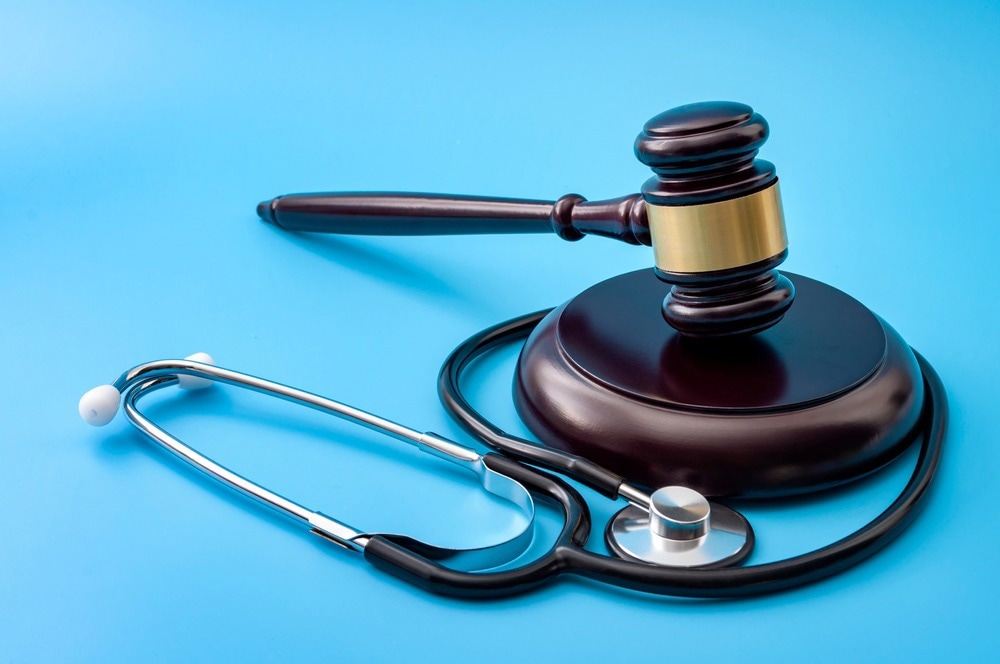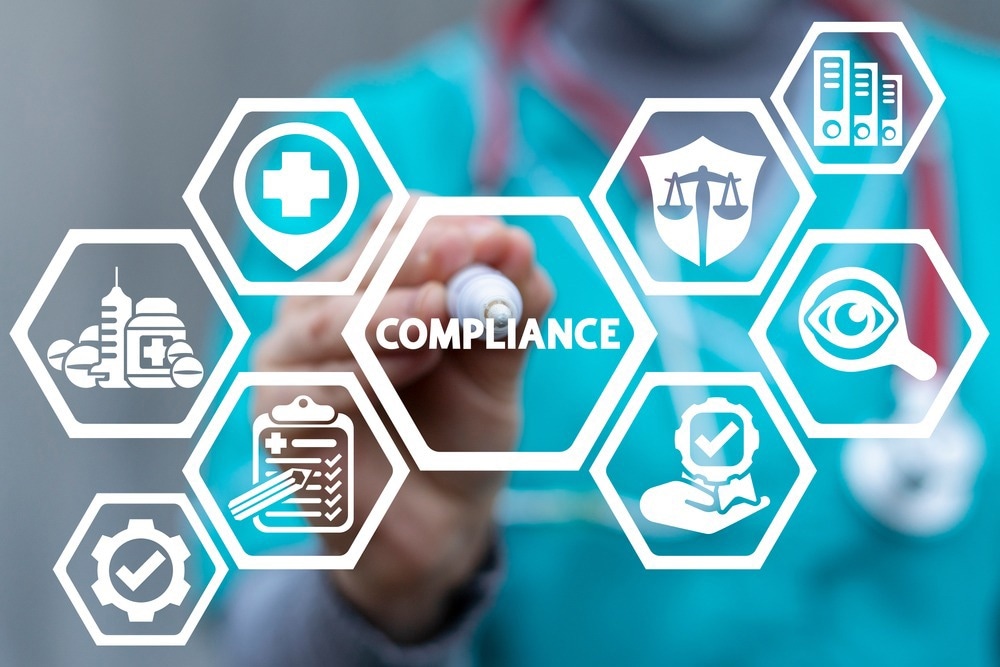The interplay of innovation and regulation in healthcare
Understanding healthcare regulations
Innovation in healthcare: a double-edged sword
Compliance challenges for healthcare providers
Striking a balance: innovating within regulatory constraints
References
Further reading
In the rapidly evolving field of healthcare, the balance between healthcare compliance and medical innovation presents an intricate issue. This article examines the complex interplay of healthcare regulation and patient safety, spotlighting the role of emerging healthcare technology. It further delves into the regulatory challenges surfacing in this dynamic sector.

Image Credit: Victor Moussa/Shutterstock.com
The interplay of innovation and regulation in healthcare
Compliance in healthcare is a cornerstone for ensuring patient safety and maintaining the integrity of healthcare systems.1 It is a legal and moral obligation that healthcare providers adhere to regulations that protect patient privacy, secure data, and uphold the quality of care.1
On the other hand, these regulations possess an important role in controlling the innovation path of new technologies and methods; in other words, they control the speed of advancing healthcare by introducing new technologies and methodologies that enhance patient outcomes and streamline healthcare delivery.2 It is through this synergy of compliance and innovation that healthcare organizations can navigate the complexities of regulations while fostering an environment conducive to medical progress.2
Understanding healthcare regulations
Healthcare regulations serve a fundamental purpose in the medical field, ensuring that the quality and safety of healthcare services are maintained at the highest standards. By setting certification guidelines and operational standards, healthcare regulations enhance the overall quality of care, compelling providers to adopt best practices and evidence-based medicine.
The importance of these regulations is multifaceted. They are essential for the effective operation of healthcare services, safeguarding the privacy and security of patient information as mandated by laws like the Health Insurance Portability and Accountability Act (HIPAA), the General Data Protection Regulation (GDPR)3 from the EU, and the Health Information Trust Alliance Common Security Framework (HITRUST-CSF).1,4
They also promote the adoption of health information technology, as seen with the Health Information Technology for Economic and Clinical Health (HITECH) Act1-2, and ensure that emergency medical care is provided to all patients through the Emergency Medical Treatment and Labor Act (EMTALA)5.
Moreover, healthcare regulations prevent unethical practices such as the exchange of referrals for monetary purposes, as prohibited by the Anti-Kickback Statute (AKS) and the Stark Law.1,4
Regulatory compliance in healthcare is a continuous process that demands deep involvement from institutions, reflecting the trust and safety of patients as core values. It involves strict protocols to minimize errors and malpractice, thereby improving the trustworthiness of healthcare providers.
Various institutions play critical roles in healthcare regulation, including the U.S. Department of Health and Human Services (HHS), which oversees agencies such as the Centers for Medicare and Medicaid Services (CMS) and the Office for Civil Rights (OCR).1 Other agencies like the Food and Drug Administration (FDA) and the Drug Enforcement Administration (DEA) are also involved in controlling healthcare providers.1
Innovation in healthcare: a double-edged sword
The healthcare sector is witnessing a rapid transformation with the advent of groundbreaking innovations.
Artificial Intelligence (AI) and Machine Learning (ML) are critical actors in this process. AI and ML have revolutionized healthcare by enhancing diagnostic accuracy, predicting patient outcomes, and facilitating informed decision-making through predictive analytics, allowing personalized and precision medicine.6

Image Credit: Panchenko Vladimir/Shutterstock.com
AI works with information from different types of sources, from genomics and imaging data (e.g., X-rays and MRI) to medical device data, such as cardiac electrical monitoring, biochemical markers, and other clinical information collected from these devices.6
Telemedicine is another advance in healthcare that has been a game-changer, especially during the COVID-19 pandemic, allowing patients to receive hospital-level care at home.6 The integration of these medical devices with telehealth platforms has enhanced remote patient monitoring and virtual consultations.6
The data collected by medical devices contributes to the growing field of big data in healthcare, which has the potential to revolutionize medical research and treatment but also poses high risks to patient safety and privacy.6 All these technologies are part of the internet of Medical Things (IoMT).6
"At this point, it's just a matter of imagination of what AI can do with healthcare...ChatGPT now, I think, is able to pass the medical exam to become a doctor" - Adam Greene, attorney, Davis Wright Tremaine on Compliance Concerns.7
However, AI, ML, telemedicine, and IoMT devices represent important regulatory challenges in healthcare compliance.8 Although these technologies have come to stay, one critical privacy issue is AI's need for tremendous volumes of data, including patients' protected health information, to build AI tools.8
Compliance challenges for healthcare providers
The healthcare industry faces the complex task of implementing comprehensive compliance programs that adhere to a wide range of requirements, including federal and state regulations, accreditation standards, and financial guidelines.8
With the increasing use of digital health records, healthcare providers are tasked with protecting patient information and ensuring data privacy.8 Cybersecurity breaches, such as the ones from OneTouchPoint9 and Community Health Systems10 have affected millions of patients, highlighting the importance of secure systems to protect patient data.
Additionally, providers must share healthcare data across different systems while maintaining compliance.8 They have to manage the risks associated with third-party business associates, as they must ensure that these partners also comply with healthcare regulations.8
Healthcare providers are also at risk of being involved in whistleblower False Claims Act (FCA) cases, and non-compliance can result in significant financial penalties, which can be devastating for healthcare organizations.8
Striking a balance: innovating within regulatory constraints
Innovations should focus on the needs and experiences of patients, ensuring that services are responsive to their needs.11 In a rapidly changing landscape, defining these ethical boundaries is critical to ensure that patient welfare is always the priority.11
In this way, dynamic regulatory frameworks can be constructed and evolved with technological advancements, helping to maximize the potential benefits of emerging technologies.11
An example of this is reSET®12, a prescription digital therapeutic for substance and opioid use disorders that have been cleared by the FDA, demonstrating successful navigation of the regulatory process.
It is important to note that balancing innovation with regulatory compliance, particularly in areas involving digital health and AI, is essential.11 This balance can be achieved by engaging with stakeholders, including legal and compliance departments, from the start of a project.11 This engagement can help define transformation projects and ensure they are compliant.
References
- P. (2023). Key Insights into Healthcare Compliance in 2024. Perimeter 81. [Online] https://www.perimeter81.com/blog/compliance/healthcare-compliance#:~:text=Compliance%20is%20the%20adherence%20to%20regulations%2C%20guidelines%2C%20and%20ethical%20standards%20aimed%20at%20safeguarding%20patient%20privacy%2C%20data%20security%2C%20and%20overall%20quality%20of%20care
- Heikkinen I, et al. (2023). Role of innovation in pharmaceutical regulation: A proposal for principles to evaluate EU General Pharmaceutical Legislation from the innovator perspective. Drug Discovery Today, 28(5), 103526. https://doi.org/10.1016/j.drudis.2023.103526
- Wolford, B. (2023). What is GDPR, the EU's new data protection law? GDPR.eu. [Online] https://gdpr.eu/what-is-gdpr/?cn-reloaded=1
- Porter, A. (2023). 8 Healthcare Compliance Regulations You Should Know. BigID. [Online] https://bigid.com/blog/8-healthcare-compliance-regulations-you-should-know/#:~:text=Healthcare%20compliance%20refers%20to%20the%20adherence%20to%20laws%2C%20regulations%2C%20and%20guidelines%20that%20govern%20the%20healthcare%20industry
- Lulla A, et al. (2022). EMS USA Emergency Medical Treatment and Active Labor Act. StatPearls - NCBI Bookshelf. [Online] https://www.ncbi.nlm.nih.gov/books/NBK539798/
- Dwivedi R, et al. (2022). Potential of Internet of Medical Things (IoMT) applications in building a smart healthcare system: A systematic review. Journal of Oral Biology and Craniofacial Research, 12(2), 302–318. https://doi.org/10.1016/j.jobcr.2021.11.010
- HIPAA Considerations for AI Tool Use in Healthcare Research. (n.d.). [Online] https://www.govinfosecurity.com/interviews/hipaa-considerations-for-ai-tool-use-in-healthcare-research-i-5249
- HIPAA, healthcare data, and Artificial Intelligence. (n.d.-a). [Online] https://www.hipaajournal.com/hipaa-healthcare-data-and-artificial-intelligence/
- OneTouchPoint ransomware victim count increases to 2.65 million. (n.d.-b). [Online] https://www.hipaajournal.com/onetouchpoint-ransomware-victim-count-increases-to-2-65-million/
- Vigo M, et al. (2023). Data breach at Community Health Systems puts 1.2 million patients at risk. WINK News. [Online] https://winknews.com/2023/05/12/data-breach-at-community-health-systems-puts-1-2-million-patients-at-risk/
- Torous J, et al. (2022). Regulatory considerations to keep pace with innovation in digital health products. Npj Digital Medicine, 5(1). https://doi.org/10.1038/s41746-022-00668-9
- reSET® - Digital Therapeutics Alliance. (2024). Digital Therapeutics Alliance - Just Another WordPress Site. [Online] https://dtxalliance.org/products/reset/
Further Reading
Last Updated: Mar 8, 2024